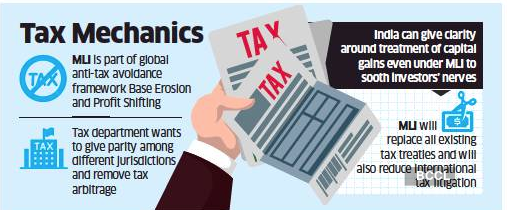[ad_1]
MLI is a common tax treaty or agreement India will have with all the countries and will replace the different tax treaties the country now has. These treaties provided grandfathering benefit. For instance, the separate amended treaties with Singapore, Mauritius and Cyprus protected investments made before April 2017 from higher or new taxes on capital gains. GAAR, the General Anti Avoidance Rule, introduced in 2016, also provided this protection.
But the MLI, which is going to replace everything from April 1 is silent on grandfathering. “With effect from 1April 2020, 30 tax treaties entered into by India will get modified as a result of MLI. Having regard to the insertion of principal purpose test, there is an apprehension whether capital gains exemption under the relevant tax treaties can be challenged by revenue authorities, despite the “grandfathering” under GAAR as also some of the tax treaties. The government should issue a clarification on the matter to allay taxpayer concerns,” said Himanshu Parekh, head, corporate and international tax, KPMG.
BCCL – Non Copyright

Tax experts say that unlike the current tax treaties the MLI framework is stricter and investors cannot just escape by showing “substance” in tax havens.
“Under MLI, the threshold to claim treaty access is generally stricter and to that extent investors will need to take cognisance of this. Even though Singapore treaty has a grandfathering clause for cap gains on equities, the MLI once in play, will mean that investors will need to adhere to the higher threshold, unless India and Singapore agree otherwise,” said Sameer Gupta, tax markets leader, EY India.
Investors fear that tax department can dig out cases for the last eight years as it’s allowed under tax regulations.
For instance, any sale of investment by an American PE fund after 2022 and where the investment is dated 2015 and routed through Singapore, could trigger a tax issue. In 2022, MLI would have replaced Singapore tax treaty and the taxman can straight away deny grandfathering benefit. To add to it, the taxman can also question rationale for investing in India through Singapore instead of directly from the US.
“Under tax treaties FPIs could show substance by showing employees in jurisdiction, but MLI only speaks about purpose of investment. Now one explanation can be given that Singapore was only used to pool money from global investors and saving tax was only an outcome of that, but a tax officer can reject this explanation,” said a tax advisor.
As per the MLI framework Indian tax authorities can levy penalties and additional taxes if it’s found that the purpose of using a tax haven or a jurisdiction was to save tax. More than 100 countries including India, signed the OECD multilateral convention in Paris in 2017 that aimed to check cross border tax evasion by MNCs.
Tax experts say that under GAAR framework—that also aims at catching investors that escape taxes— any officer can issue notices to investors.
“Just like in the case of GAAR, it would be worthwhile to introduce the concept of an Approving Panel to whom each case of PPT should be referred to before the Tax Officer actually invokes it,” said Parekh.
[ad_2]
Source link

